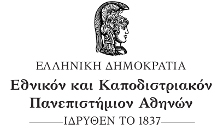It is my pleasure to welcome you to the Faculty of Communication and the Media Studies of the National and Kapodistrian University of Athens. As Faculty Chair, I am proud to be part of a vibrant community of scholars-teachers.
The Faculty of Communication and Media Studies is one of the youngest within the oldest Higher Education Institutions founded in Greece 1832. The Faculty of Communication and Media Studies was set up in 1989 (decree 527/6-10-1989) and has been active since 1990. It became autonomous in 1993.
The Faculty of Communication and Media Studies is in the vanguard in the field of communication theory and media practice in Greece. The theoretical expertise and empirical research of our staff is recognised as having been at the forefront of media and cultural studies for the past decade, and is the focus of a thriving research and postgraduate community. The Faculty comprises 3 Departments:
a) The Department of Social and Political Analysis of Communication.
b) The Department of Culture, Applied Communication and Technology.
c) The Department of Communication Psychology, Communication Practices and Planning.
It offers a B.A. Honours Degree (4 years) and a postgraduate programme that leads to a PhD.
Since 1996, the Faculty of Communication and Media Studies has been offering an interdisciplinary postgraduate programme in Communication and Media Studies. In 2009-2010, the newly revised M.A. course programme offered specialization in five areas:
- European Communications: Structures and Policies
- Public Opinion and Public Communication
- Digital Media and Interactive Environments
In April 1996, the Faculty of Communication and Media Studies organised its first International Conference on "The 'Construction' of Reality and the Mass Media"; in May 2001, a second International Conference took place, under the title "The Digital Challenge: Media and Democracy". Since then, the Faculty has organized numerous conferences, congresses and seminars in almost all areas of the communication studies.
The Faculty is located at the centre of Athens. It offers courses to nearly 900 students and employs over 40 professorial staff members, tenured instructors, and associates from other academic institutions and media organizations. International relations have been developed with other European academic institutions through the Socrates/Erasmus student and Faculty exchange programs.
The Faculty's research arm is the University Research Institute of Applied Communication (URIAC). Founded in 1996, it aims to systematically monitor and research the field of communication and culture in Greece. The Institute of Applied Communicationalsoaims:
- to undertake basic and applied research,
- to organize and coordinate postgraduate courses and continuing education seminars and programmes,
- to foster collaboration with relevant research institutes in Greece and abroad.
- It also aims to organize lectures, courses, conferences and symposia in the field of communication and culture,
- to publish scientific papers and provide consultancy on communication development, journalism, advertising, public relations, cultural and social communication, planning and use of new technologies.
Zitimata Epikoinonias (Communication Issues) is the academic journal published by the Faculty of Communication & Media Studies and the University Research Institute of Applied Communication. It is the only academic communication journal in Greece and provides a platform for the promotion and presentation of international and Greek research and discussion concerning the media, including new information and communication technologies, within their political, economic, cultural and historical contexts. It engages critical discourses in various aspects of communication and the media: media history, globalization of communication, media institutions, media analysis, media criticism, media policy, new media, drawing on a wide range of disciplinary perspectives and on both theoretical and empirical research.
The Faculty's courses are designed to provide students with a broad overview of theories and developments in communication and media studies with detailed analysis of sectors and issues of their own choice. The staff profile fits the interdisciplinary profile of the courses, weaving together perspectives, theories, and methodologies from the fields of sociology, psychology, education, political science, anthropology, philosophy of science, history, media studies, media production, computer science, cultural studies, and critical legal theory. The Faculty has also a strong commitment to media practice and research activity. Within this context, students are encouraged to engage critically with the different approaches to the media in a variety of academic and practice disciplines; to develop skills in research and presentation and to explore creative possibilities across a range of media.
Our alumni have gone on to further academic study and to employment in many fields, including, a wide range of local state and private organizations, and professions related to industry, journalism, advertising, public relations and research.
Professor
Georgios Plios
Chair of the Faculty
